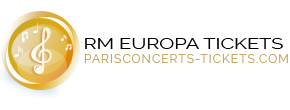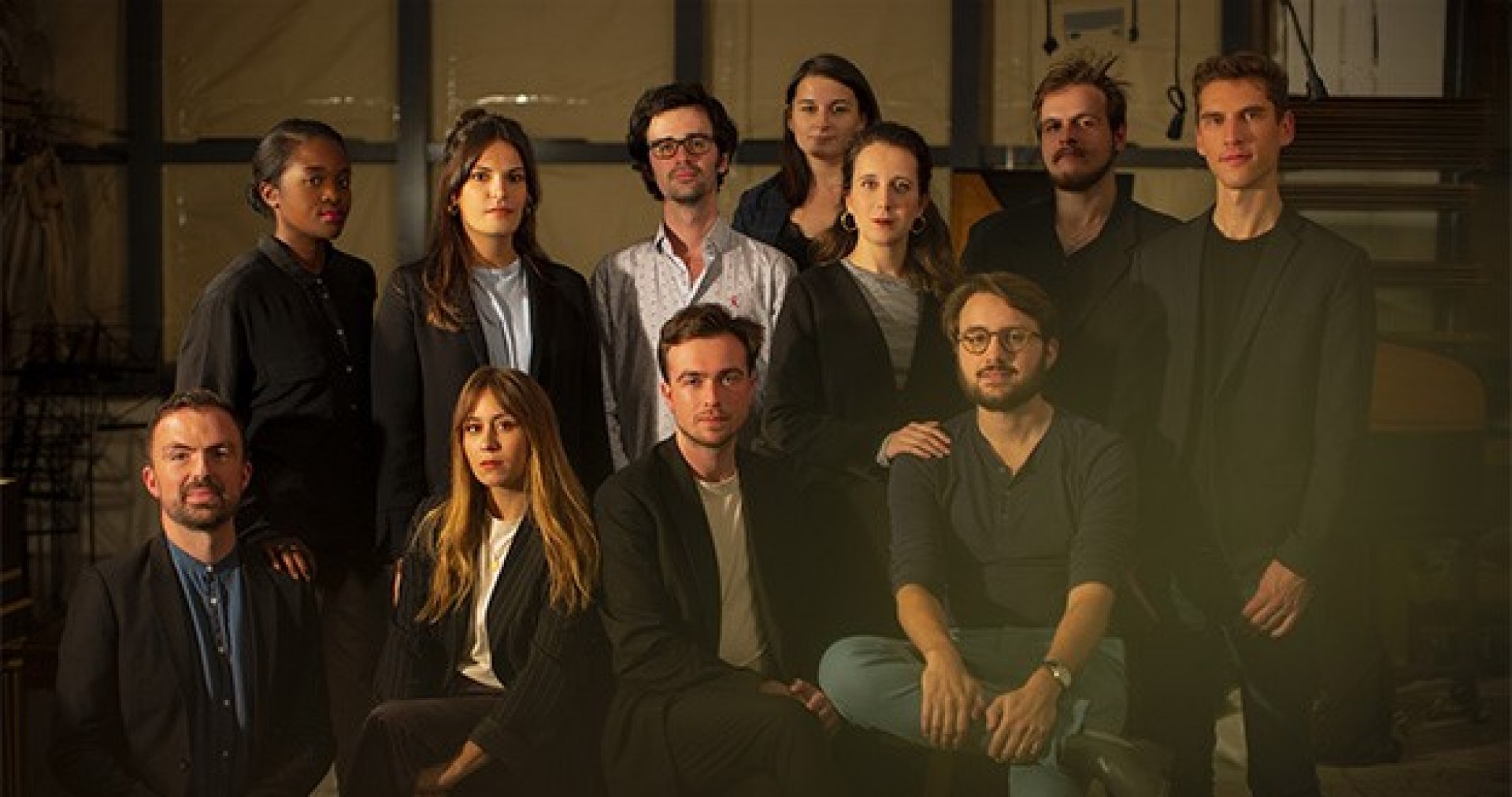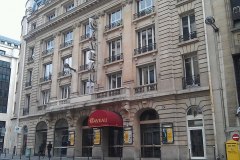Vox 21 and City of London Schools Camerata
Mo | Tu | We | Th | Fr | Sa | Su |
For their first meeting, Vox 21 and the City of London Schools' Camerata will perform Maurice Duruflé's Requiem - a French work at the heart of the choral repertoire across the Channel - and motets by Richard Quesnel, choirmaster of the Camerata and associate composer of Vox 21 for the 2024-2025 season.
Organist and composer, Maurice Duruflé (1902-1986) left a catalogue of almost exclusively sacred music. A lover of Gregorian chant, which he practiced almost daily in the liturgy, Duruflé composed his entire Requiem from melodies from this tradition. For this concert, Vox 21 and the City of London Schools' Camerata sing the third and final version of the work written in 1961 for choir and chamber instrumental ensemble, almost 15 years after the first two (for large orchestra and for solo organ).
The premiere of the original version of the work took place in 1947 at the Salle Gaveau in Paris, where the public heard for the first time the organ and the instrumental ensemble dialogue in a perpetual intertwining, offering a setting of great refinement to the choral part. The latter, very colorful and refined, testifies to the science of the choir that Maurice Duruflé possessed. He dedicated this very meditative and luminous Requiem to his father.
Vox 21
Born in 2016 under the leadership of Evann Loget-Raymond, Vox 21 is a vocal and instrumental ensemble. The core of the work of these musicians is music for vocal ensembles, from Gregorian monody to great romantic polyphonies. In addition to works from the Western heritage, Vox 21 regularly explores the works of contemporary composers.
The ensemble combines musicians collaborating with the greatest ensembles in France and Europe with young talents from major music schools, academies and winners of international competitions. These musicians come together in Vox 21 out of a passion for the repertoire, but also to enrich the interpretation by drawing on the different cultures and specializations of each: early music, traditional music and the great choral tradition.
Since its beginnings, the ensemble has performed in particular at the Academy of Sacred Music in Sainte-Anne-d'Auray, at the Théâtre des Champs-Élysées, at the Grands Concerts in Lyon and at the Saintes Festival.
City of London Schools' Camerata
The City of London Schools' Camerata is a mixed-voice chamber choir of around twenty young singers. They are all educated in two schools located in the historic centre of the City of London, between the Roman ruins and the towers of the financial district, in the shadow of St Paul's Cathedral. The schools benefit from privileged links with various specialist teaching partners including the Guildhall School of Music and Drama; several students have been masters at the Chapel Royal, St James's Palace, Temple Church, and Southwark Cathedral.
They participate in the ambitious music programs of the City Schools; in 2023 they presented a program of choral works by Lili Boulanger and Gustav Holst with orchestra and this summer they are giving a concert dedicated to Shakespeare's texts set to music by contemporary composers as part of the “Summer Music in City” festival.
The choir is directed by Richard Quesnel, music director of the City Schools, former choirmaster of the Maîtrise de Sainte Anne d'Auray, recent winner of the Bettencourt Prize. Richard Quesnel is a composer and choirmaster, an Agrégé d'Education musicale, holder of the State Diploma in ensemble conducting and a Knight of the Order of Arts and Letters.
Evann Loget-Raymond
Evann is a young musician born in Brittany. He divides his time between his activities as a countertenor, conductor and composer. He began his apprenticeship at the Academy of Music and Sacred Arts in Sainte-Anne-d'Auray where he began working in vocal ensembles as a child and was guided by the composer and choirmaster Richard Quesnel. At the same time, he learned piano and accompaniment at the Vannes Conservatory. From 2015 he continued his studies in Paris, in the singing classes of Robert Expert and Jean-Philippe Zielinski, then in the conducting class of Marc Korovitch. In 2017, he joined the first class of the Philippe Jaroussky Musical Academy. Evann is also a graduate of the École de Grégorien de Paris where he worked with Louis-Marie Vigne.
As a singer, he performed for the first time as a soloist in 2015 in Purcell's "Verse Anthems" with the Stradivaria ensemble (conducted by Daniel Cuiller) before singing with the Artaserse ensemble (Philippe Jaroussky), Matheus (Jean-Christophe Spinosi), Les Arts Florissants (William Christie) and Les Cris de Paris (Geoffroy Jourdain). These ensembles and orchestras led him to sing as a soloist in venues such as the Theater an der Wien, the Royal Opera of Versailles, the Moscow Philharmonic, the Seine Musicale and the Palais de Tokyo.
Alongside his conducting studies, he created Vox 21, his own vocal and instrumental ensemble with which he performed at the Académie de Musique Sacrée de Sainte-Anne-d'Auray, the Théâtre des Champs-Élysées, the Grands Concerts in Lyon and the Festival de Saintes. In 2023, Evann was appointed conductor of the symphonic choir of the COGE (Choeurs et Orchestres des Grandes Ecoles). In addition to these formations, he was invited to conduct the orchestra of the Festival de Musique Ancienne de Saorge, and assisted Richard Wilberforce in conducting the Accentus choir as well as Franck-Emmanuel Comte in conducting the Concert de l'Hostel Dieu.
His passion for composition led him to write his first pieces as a teenager. His latest works include "Under the recieding wave" for the Aesthesis quartet, "Pathways to Inner Houses" for the Orchestre du Printemps (Aurélien Rauss), the theme song for the podcast "Among us the devil" for Capucine de Chocqueuse, the soundtrack for the short film "Je suis Cléromantique" for Anne-Laure Maudet and Reùven Abbou and "Seven Last Words" for the TriOde choir.
Richard Quesnel
Richard Quesnel is a choirmaster, composer and teacher. After graduating from Cambridge University, he worked for almost 20 years in France, first at the choir and theatre of Caen, then as choirmaster at the Academy of Music and Sacred Arts of Sainte-Anne-d'Auray. In 2009, he was made a Knight of the Order of Arts and Letters by the Minister of Culture. He has frequently collaborated with musicians from classical, traditional and jazz cultures: Orchestre de Bretagne, Stradivaria, Mélisme(s), Maîtrise de Notre-Dame de Paris, Alain Buet, André le Meut, Yann-Fanch Kemener, the duo Nijadell and Didier Squiban.
Since returning to the UK in 2017 he has held two prestigious posts, first as Director of Music at St George's College Weybridge, and now as Director of Music at the City of London School, the historic home of the Chapel Royal Choristers. He champions musical partnerships across the City of London, and his current projects include composing a new cantata for a group of choirs to mark the 300th anniversary of Sir Christopher Wren's death, to be sung under the dome of St Paul's Cathedral.
Richard has composed extensively for vocal ensembles and his catalogue includes numerous oratorios, cantatas and masses. ‘DragonSong’ , a retelling of the legend of St George and the dragon for choir, soloists and orchestra, was premiered at Handel’s Church in St George’s Hanover Square in 2020; ‘Promesa’ – an oratorio in three acts – was performed at the First World War centenary commemorations; ‘Messe Armoricaine’ – for equal voices and string quartet was commissioned by St Botolph-without-Bishopsgate in London, as a sister to Jehan Alain’s ‘Messe Modale’ and draws on elements of traditional Breton music. His music has been performed at the Rodolfus Choral Courses, at the Royal Naval College Chapel in Greenwich, as well as by the choir of Notre-Dame de Paris, the Collegium Vocale of Munich, the Solis Camerata – Arizona State University and by choir groups in Lourdes and Strasbourg. Richard has also written for theatre productions (Absolute Theatre/Battersea Arts Centre), films, short films and documentaries (Aurora Media/Amazon Prime and Fugue State Films). His piano improvisations and arrangements for piano and string quartet of traditional Breton music are available on listening platforms (“Nijadell”, “Le chant de la bombarde”) and his works are published by Cecilia Editions, A Coeur Joie, Kinnor and Voix Nouvelles.
Program and cast
Program
Maurice Duruflé , Requiem (1961 version)
Richard Quesnel , Motets for a capella choir
Interpreters
Vox 21 (vocal and instrumental ensemble)
Direction Evann Loget-Raymond
City of London Schools' Camerata (chamber choir)
Conducted by Richard Quesnel
Salle Gaveau
The Salle Gaveau, named after the French piano maker Gaveau, is a classical concert hall in Paris, located at 45-47 rue La Boétie, in the 8th arrondissement of Paris. It is particularly intended for chamber music.
Construction
The plans for the hall were drawn up by Jacques Hermant in 1905, the year the land was acquired. The construction of the Gaveau building took place from 1906 to 1907. The vocation of this hall was chamber music from the beginning, and its seating capacity was a thousand, just as it is today. The hall was home to a large organ built in 1900 by the Cavaillé-Coll|Mutin-Cavaillé-Coll firm. This instrument with 39 stops (8 on the positive, 12 on the recitative, 12 on the grand organ and 7 on the pedal) was subsequently installed in 1957 in the commune of Saint-Saëns in Normandy. The hall is a concert venue renowned for its exceptional acoustics.
The room
In some 110 years, the Salle Gaveau has established itself in the Parisian musical landscape as an essential music venue. Find out the important dates of this hall full of history which has hosted the greatest pianists of the 20th century.
1905 - 1907
BIRTH OF THE GAVEAU ROOM
The land on which the Gaveau building is built was acquired in 1905. The plans for the hall were drawn up with particular attention to acoustics at the end of 1905 by the architect Jacques Hermant . The building was built in 1906-1907 and the Gaveau hall was immediately the prestigious hall in Paris. Its main purpose has always been piano and chamber music but orchestras were often heard there. The number of seats has changed slightly over time to around 1000 seats . The current number is 1020.
1907 - 1908
PROMISING BEGINNINGS
The Salle Gaveau opened its doors for the 1907-1908 season. The first concert was given on October 3, 1907 by the Bremer Lehrergesangverein . It was a vocal concert given with 140 performers. Thus, despite its average dimensions, the Salle Gaveau was not afraid to welcome large groups and it can be noted that from this season onwards, it hosted the Lamoureux concerts which gave concerts there under the direction of Camille Chevillard , Vincent D'Indy , and André Messager .
The 1907-1908 season was very brilliant in the field of chamber music. Cortot, Thibaud and Casals performed the complete Beethoven trios and trio variations there on November 5, 8 and 12. Eugène Ysaye gave a recital there on January 21, 1908. Marguerite Long performed there on December 11, 1911.
1912
ENESCO, KREISLER, CORTOT...
In the field of chamber music , some superb concerts in 1912: Enesco on February 8 with the pianist Eugène Wagner. Fritz Kreisler on April 21 and 28, Wilhelm Backaus on May 15, Cortot, Thibaud and Casals on May 24 and 31.
1933 - 1934
LAMOUREUX AND PASDELOUP CONCERTS
The war did not interrupt the artistic activity of the Salle Gaveau but the hall was used for galas given for the benefit of soldiers or victims of the war.
After the war the hall had a very brilliant period with the Lamoureux and Pasdeloup concerts . Great conductors conducted there: Charles Munch on October 28, 1933.
The great pianist Rudolph Serkin performed on December 2, 1933. Wanda Landowska gave a recital on a Pleyel harpsichord on November 7, 1933. Yves Nat performed Beethoven's sonatas in 1934.
1939 - 1944
A TROUBLED PERIOD
During the Second World War, the hall rediscovered its vocation to host galas.
Berthe Bovy recited fables by La Fontaine .
During the occupation, great soloists were heard: Paul Tortelier, Pierre Fournier, Raymond Trouard, Jacques Fevrier . From 1944, Samson François performed regularly. Germaine Lubin sang melodies accompanied on the piano by Reynaldo Hahn .
1976
RESUMPTION OF THE ROOM BY C. AND JM FOURNIER
Only the bankruptcy of the Gaveau house, which occurred in 1963, came to shake its sustainability...
The building, partly resold to an insurance company, soon lost its splendor. Under pressure from land, the hall escaped in extremis the threat of a parking lot thanks to the saving energy of Chantal and Jean-Marie Fournier , a couple of passionate musicians, who acquired it in 1976 and have kept it alive for 25 years.
1992
THE ROOM CLASSIFIED AS A HISTORICAL MONUMENT
Listed in the inventory in 1982, classified in 1992 in the wake, Gaveau was saved from the worst but in pitiful condition. "Everything was very tired and we were beginning to fear that a seat would give way in the middle of a performance", testify the masters on board who sounded the alarm in order to obtain subsidies for the restoration.
The work, conducted under the direction of the chief architect of historic monuments, Alain Charles Perrot (already officiating on the Paris Opera), aims to restore listening comfort without affecting the unique sound of the hall, the secret of its success.
2001
THE RENOVATION FINALLY COMPLETED
If the sound remains, the tone changes: "The spectators will be very surprised to discover the original stripping and sobriety of this modern room ahead of its time", explains Alain Charles Perrot. The architect has tried to rediscover the strict gray with gold accents of the historical decor, and the originality of the lighting, its bare bulbs "like pearls on the ceiling". Reconstructed identically , the armchairs with metal legs and wooden frames reconnect with the original buttercup yellow.
Restored to its truth, Gaveau is banking on increased attractiveness to seduce a new audience, including companies in the "golden triangle" for private parties. The future of this high-end room is based on a healthy complementarity of activities, always with music shared. The room reopens its doors on January 8, 2001. A reopening concert is then a landmark, with the great Roberto Alagna
on the bill .

 EN
EN DE
DE IT
IT FR
FR ES
ES RU
RU JP
JP RO
RO
 Seating plan
Seating plan 
